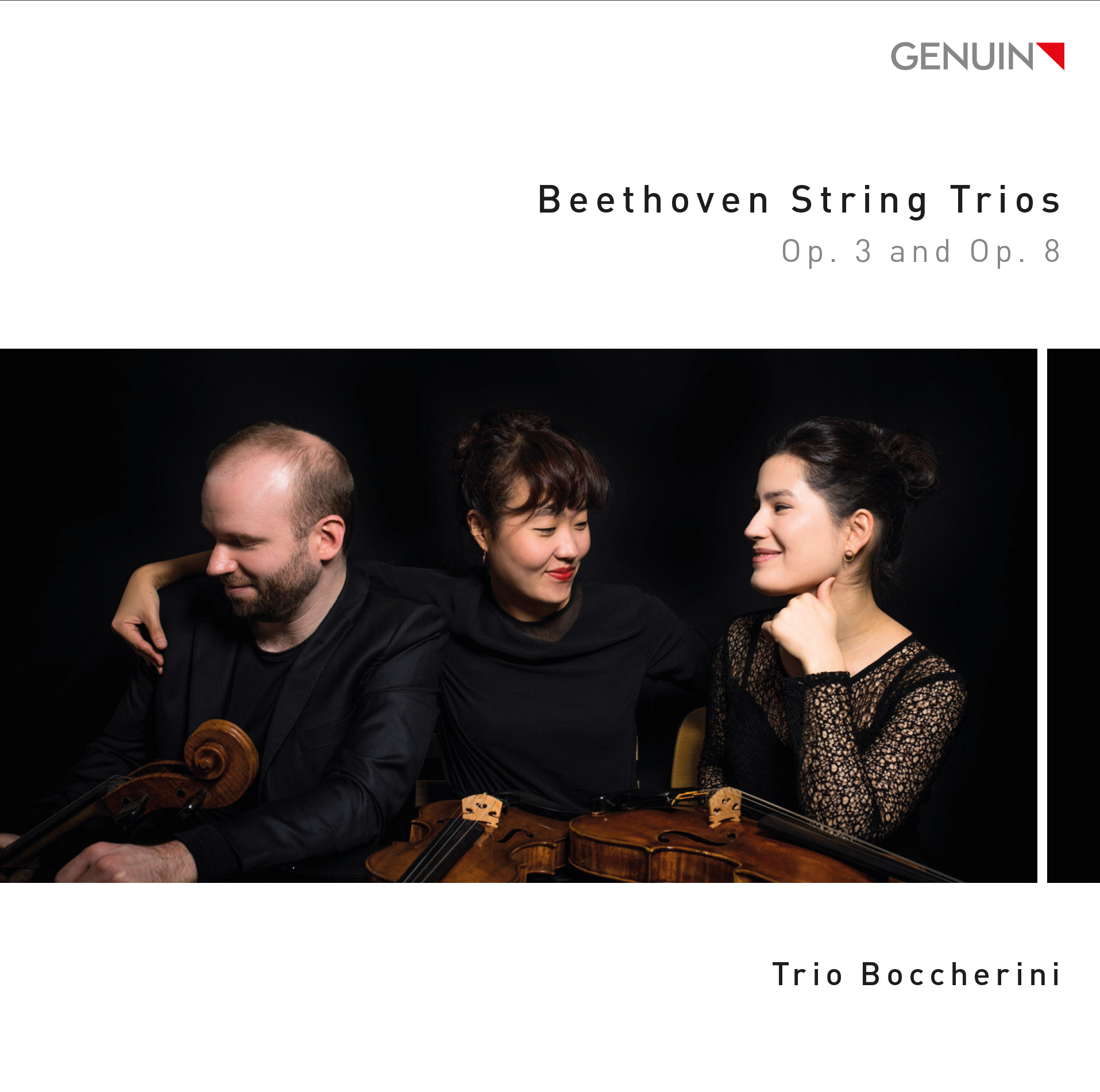Hungarian String Trios

Out for streaming and purchase April 12, 2024
Official release concert in Piano Salon Christophori, Berlin, 30 April, 2024
Beethoven String Trios
Op. 3 and Op. 8

Pre release concert in Teatro La Fenice, Venice, September 24 and 25, 2021
Out for streaming and purchase October 1, 2021
Official release concert in Piano Salon Christophori, Berlin, 28 October, 2021
Beethoven String Trios
Op. 9 Nos. 1–3

Das Orchester
“Thus one enjoys sovereignly balanced sounds in the slow movements as well as wild contrapuntal virtuoso roaring in the scherzos or the final movements. The Trio Boccherini obviously has the necessary curiosity to question the relevance of the classical repertoire, to brush it against the grain, so to speak.”
WDR3 Tonart
The Boccherini Trio implements this ever-repeating, questioning, talking, hanging on to thoughts in an absolutely credible manner. This is one of the ensemble’s strengths, which is evident throughout the recording.
Deutschlandfunk Kultur
“Heart and mind. With Trio Boccherini, the two combine organically and logically.”
Review by Das Orchester
Before Beethoven made himself immortal in the sacred discipline of string quartet, he explored the possibilities of the string trio briefly but in detail. After the early op. 3 and 8, which are still strongly linked to Mozart and Haydn, the three trios op.9 – which the man who had just left the province of Bonn put on paper as a kind of visiting card for his new home Vienna from 1796 to 1798 – are at the same time the high point as well as the end of this genre in his oeuvre, and which set standards up to the present day. Innovative, very tricky, demanding, this is for connoisseurs, which requires professionals rather than good amateurs on the instruments.
It is certainly due to this jubilee year, which is so alarmingly lacking in music, that the Trio Boccherini recorded Beethoven’s op. 9 for the CD, produced by the excellent Leipzig label Genuin. The three musicians – Suyeon Kang (violin)
, Vicki Powell (viola) and Paolo Bonomini (cello) – met in Berlin in 2014 and have since matured into one of the most interesting chamber music ensembles in the classical circuit.
Three musicians, three cultural backgrounds, one goal: unity. The Trio Boccherini is constantly working on this goal receiving impulses from members of renowned chamber musicians such as Rainer Schmidt (Hagen Quartet) or Hatto Beyerle and Günter Pichler (Alban Berg Quartet). And right from the first sounds of the G-major trio, the musiciansʼ unconditional will catches your ears, both to show their own individuality and at the same time their ability
to listen to one another and the voices of their old Italian instruments, dialoguing in the service of a higher whole.
You can enjoy perfectly balanced sounds in the slow movements as well as wild contrapuntal virtuoso playing in the Scherzi or the final movements. The trio obviously has the necessary curiosity to question the
relevance of the classical repertoire, to go against the grain, so to speak. This becomes
ear-catching, for example in the rather daring tempos of the fast movements and in the
desire to savor Beethovenʼs formal and harmonic escapades. And in the slow movements,
the great care in their phrasing and sound.
A sense of harmonious well-being is established in the ear. It is a pleasure to encounter Beethoven’s work once again on a side path, with all the associations that Opus 9 triggers with regard to the String Quartets Op. 18, composed just a year later. That the lack of a second violin – to the four-part ideal! – is hardly noticeable, is the merit of the three musicians from Berlin, who are unmistakably led and at the same time inspired by the famous violinist. It time to see the three of them live again.
Bevor Beethoven sich in der kammermusikalischen Königsdisziplin Streichquartett unsterblich machte, lotete er kurz, aber ausführlich die Möglichkeiten des Streichtrios aus. Nach den frühen Opera 3 und 8, die noch stark an Mozart und Haydn anknüpfen, bilden die drei Trios op. 9, die der gerade aus der Bonner Provinz Abgereiste als eine Art Visitenkarte für seine neue Heimat Wien von 1796 bis 1798 zu Papier brachte, zugleich Höhe- wie Endpunkt dieser Gattung in seinem OEuvre und setzen Maßstäbe bis in die Gegenwart. Innovative, ganz schön vertrackte, in jeder Beziehung anspruchsvolle Musik für Kenner, die an den Instrumenten Profis viel eher als gute Laien voraussetzt.
Nun ist es sicher diesem so erschreckend musikarmen Jubiläumsjahr zuzuschreiben, dass das Trio Boccherini Beethovens op. 9 für die CD aufnimmt, produziert vom exzellenten Leipziger Label Genuin. Die drei Musiker – Suyeon Kang (Violine), Vicki Powell (Viola) und Paolo Bonomini (Cello) – haben 2014 in Berlin zusammengefunden und sind seitdem zu einer der interessantesten Kammermusikbestzungen im Klassikzirkus gereift.
Drei Musiker, drei kulturelle Hintergründe, ein Ziel: Einheit. Daran arbeitet das Trio Boccherini stetig und mit kontinuierlichen Impulsen von Mitgliedern renommierter Kammermusiker wie Rainer Schmidt (Hagen-Quartett) oder Hatto Beyerle und Günter Pichler (Alban Berg Quartett). Und gleich bei den ersten Klängen des G‑Dur-Trios, der Nummer 1, fällt dieser unbedingte Wille der Musiker ins Ohr, sowohl die je eigene Individualität in die Waagschale zu werfen wie zugleich das Vermögen, einander zuzuhören und die Stimmen der alten italienischen Instrumente einander anzupassen im Dienste eines höheren Ganzen.
So genießt man souverän austarierte Klänge in den langsamen Sätzen ebenso wie wildes kontrapunktisches virtuoses Getös’ in den Scherzi oder den Finalsätzen. Das Trio Boccherini bringt ganz offensichtlich die nötige Neugierde mit, das klassische Repertoire auf seine Relevanz zu befragen, quasi gegen den Strich zu bürsten. Das wird ohrenfällig etwa in ziemlich gewagten Tempi der schnellen Sätze, an der Lust, Beethovens formale und harmonische Eskapaden auszukosten. Und an der großen Sorgfalt, mit der die langsamen Sätze phrasiert und klanglich gestaltet sind.
Im Ohr stellt sich demnach Wohlbefinden ein. Es macht Vergnügen, Beethovens Werk wieder einmal auf einem Seitenweg zu begegnen, mit all den Assoziationen, die das Opus 9 etwa im Hinblick auf die nur ein Jahr später entstandenen Streichquartette op. 18 auslöst. Dass dabei das Fehlen einer Zweiten Geige – zum vierstimmigen Ideal! – kaum auffällt, ist das Verdienst der drei Musiker aus Berlin, die von der famosen Geigerin unmissverständlich angeführt und zugleich inspiriert werden. Es wird Zeit, die drei einmal wieder live erleben zu können.
Armin Kaumanns
